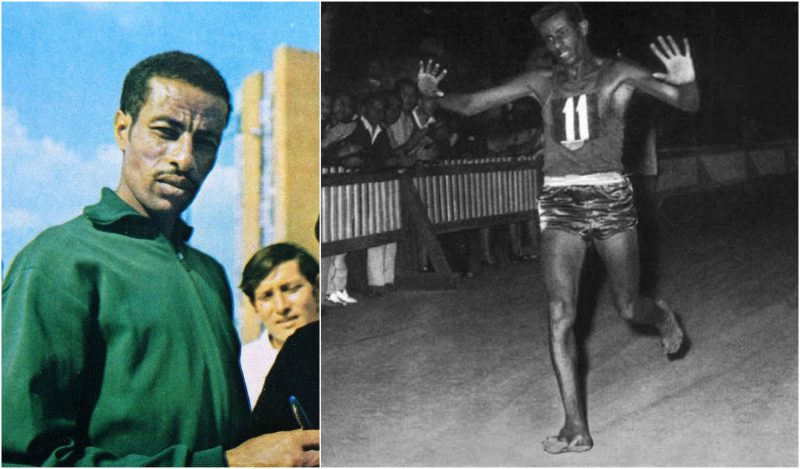Abebe Bikila was born on August 7, 1932, the day of the Los Angeles Olympic marathon, and 28 years later he won the gold medal at the 1960 Summer Olympics while running barefoot.
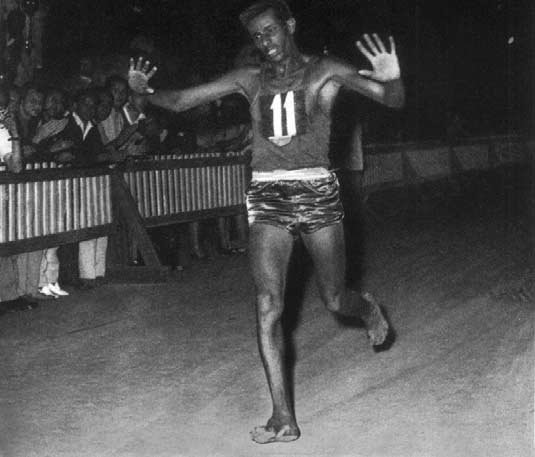
Young Abebe worked as an Imperial Bodyguard to support his family, and each day he walked over 20 kilometers to Addis Ababa where worked for the members of the royal family. Back then, he couldn’t have imagined that the stadium in Addis Ababa would be named in his honor.
He was soon spotted by Onni Niskanen, a Finnish-born Swede, who was sent to Ethiopia to find talented athletes. And as sudden as everything else in Abebe’s life, it was decided for him to replace Wami Biratu, who was seriously ill at the 1960 Olympics just before the plane for Rome was departing.
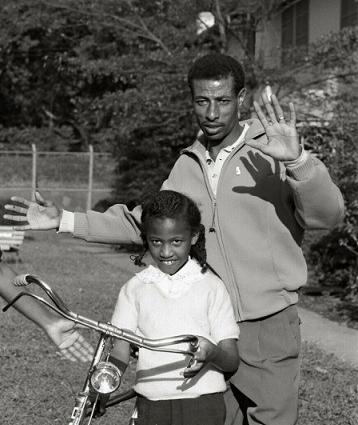
Adidas was the shoe sponsor at the 1960 Summer Olympics, and they had a few shoes left when Abebe went to collect his, ending up with a pair that didn’t fit comfortably. In the end, he decided that he would run the race just as he practiced for it at home – barefoot.
Niskanen warned Abebe about his main rivals, one of whom was Rhadi Ben Abdesselam from Morocco, who was supposed to wear number 26. For unknown reasons, Rhadi did not collect his black marathon bib before the race, and instead was wearing his regularly assigned track and field bib number 185.
During the race, while Abebe was running, he was trying to spot the number 26 among the competitors and didn’t realize that Rhadi was running just beside him. They stayed together until the last 500 m, when Abebe sprinted to the finish line. Abebe won in a record time of 2:15:16.2, becoming the first Sub-Saharan African to win an Olympic gold medal. He finished 25 seconds ahead of Rhadi.
After the race, when Abebe was asked why he had run barefoot, he replied, “I wanted the whole world to know that my country, Ethiopia, has always won with determination and heroism.”
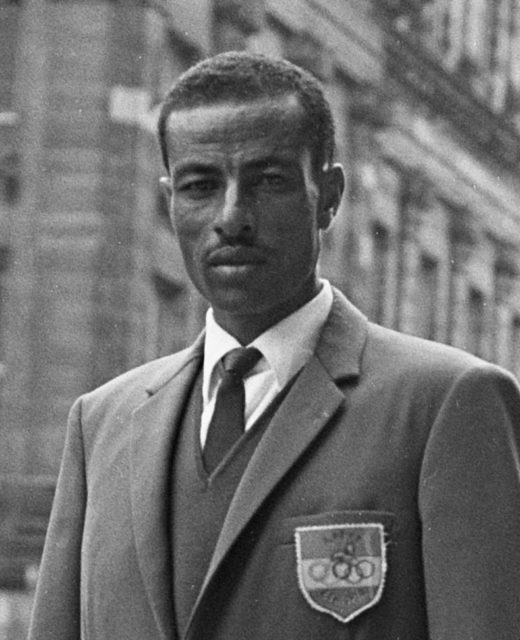
In 1961, Abebe ran marathons in Greece, Japan, and Czechoslovakia, all of which he won. And then suddenly, Abebe finished 5th at the 1963 Boston Marathon, which was the only time in his career that he ended a marathon and did not win. He returned to Ethiopia, and he didn’t compete in another marathon until the one in Addis Ababa in 1964.
Nothing could prevent Abebe from running and winning, not even his body. Only 40 days prior the 1964 Summer Olympics in Tokyo, Abebe collapsed while training for the marathon and was diagnosed with acute appendicitis. He was hospitalized, but he spent the evenings jogging in the hospital courtyard. And even though he wasn’t expected to run at the Olympics, he entered the Marathon. Even less expected was for Abebe to win the marathon, but he did.
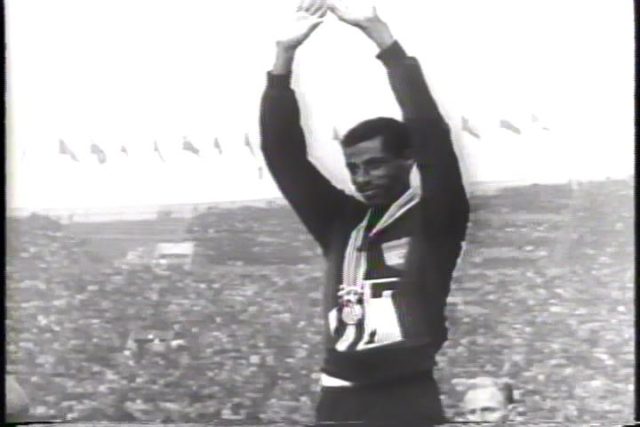
Using the same tactic as he did in Rome, he left behind Basil Heatley of Great Britain and Kokichi Tsuburaya from Japan, taking the gold for himself. Abebe returned to Ethiopia to a hero’s welcome once again. He was again promoted by the Emperor, and he received his own truck, a white Volkswagen Beetle with some upgrades.
While, he didn’t win at the 1968 Summer Olympics in Mexico City, but it wasn’t his fault; it was his knee’s. The man ran with a broken bone in his knee and had to give up the race. Abebe was invited as a special guest to the 1972 Summer Olympics in Munich, where he witnessed his countryman Mamo Wolde fail to match Abebe’s twin marathon victories, ending in third.
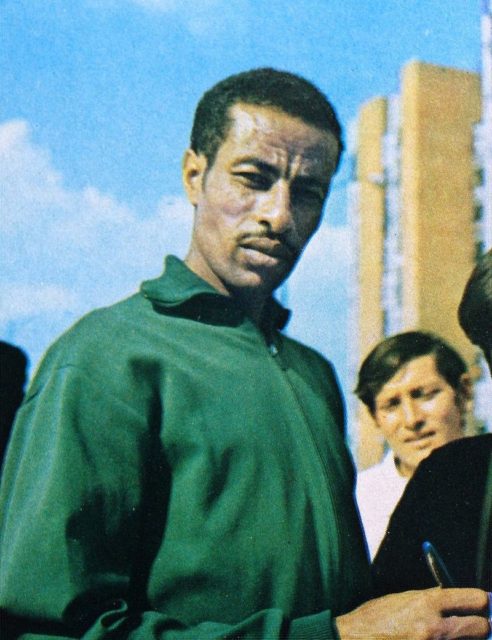
On October 25, 1973, Abebe Bikila died in Addis Ababa at the age of 41 from a cerebral hemorrhage, a complication related to the accident of four years earlier. He left behind his wife and four children. His funeral was attended by 75,000 people. Emperor Haile Selassie I of Ethiopia proclaimed a national day of mourning for the country’s national hero. Newspapers throughout Africa eulogized him as an inspiration to their own distance runners, some of whom won gold medals in future Olympics. Abebe was interred at Saint Joseph’s Church Cemetery in Addis Ababa.
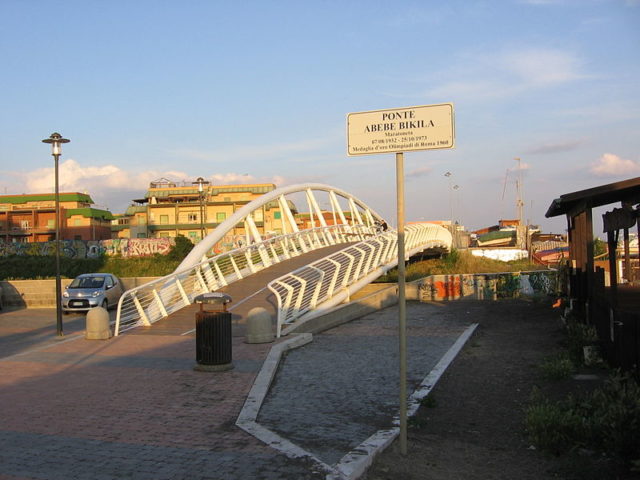
Five years after his death, the New York Road Runners inaugurated an annual award in his honor – the Abebe Bikila Award, which is given to individuals for their contributions to long-distance running
